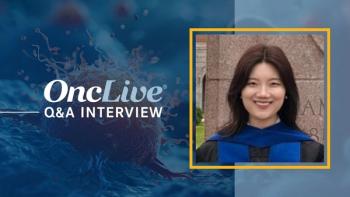
Selecting a BTK Inhibitor for Mantle Cell Lymphoma
Transcript:
Michael Wang, MD: It is very hard to differentiate 1 BTK inhibitor over another. Think about it: If you have 3 children and you mentor them, you brought them up, which 1 is your favorite? In the American culture you cannot really say, “Oh, my daughter over the 3.” You cannot. The same feeling I have for the 3 drugs. I was very involved in the ibrutinib therapy, although I was mainly focused on mantle cell lymphoma. Of course, there’s other colleagues that have made it 6 indications. And then I was the lead author for the acalabrutinib on mantle cell lymphoma. Of course, CLL [chronic lymphocytic leukemia] was recently approved.
Of the 3 agents, if you ask me which is better, because there have never head-to-head clinical trial scientific comparisons, it is very hard for me to say which is better. Sometimes the overall response rate is a little higher from one, but their patient population is different. The scans they use could be different, so it’s very hard. Well, how do I choose in the clinic? In the clinic, for example, ibrutinib has a little atrial fibrillation, has a little fatigue, neuralgia. I sometime use that first, and if things don’t work a little better, I switch to the other one. Sometimes for the very old population of patients, I choose the second BTK inhibitor a little earlier. Different drugs have different properties. Ibrutinib has more immune reactions and toxicities. Immunotherapy therapy is approved for GVHD [graft-vs-host disease], so I tend to use ibrutinib in the younger patients. I believe ibrutinib has immunotherapy properties. But acalabrutinib is a very clean drug; the adverse effects so far are good.
I cannot say that 1 drug is less toxic than another because we have treated nearly 150,000 patients around the globe with 6 years’ follow-up with the first ibrutinib. The acalabrutinib was approved 2 years ago. We have treated dramatically fewer patients, with the follow-up time being only 2 years. The more time you have follow-up, the more toxicity you will discover. While zanubrutinib was approved in November, we have treated much fewer patients than with the previous 2 drugs. And I cannot see which 1. They have not treated enough patients and enough follow-up over time to compare the toxicities completely. I cannot say which is more positive or which is more efficacious and less toxic, but I know the internal properties to choose for the population.
In the community, that will be a hard choice. Let me share with you my experience with my interaction with the American patients I treated with zanubrutinib. About 90% of drugs are made in America. Then they will be transferred to Europe for therapy and eventually to Asia. Only a few drugs are made in Europe and then come to America. The majority, by far, are invented in America. All of a sudden we have a Chinese drug. This is just a little joke. My patients asked, “Dr Wang, from the Internet, this looks like a Chinese drug. Is this a Chinese drug?” I said, “It is. What do you think about it? Do you want me to switch to the American?” They respond “No, no, no, the Chinese drug is working, so why should I?” The patient really is looking for the efficacy and the toxicity profile.
In zanubrutinib the response rate is very high. Of course, some patients have 2 prior lines of therapy and others have more prior lines of therapy. If you treat patients with many chemotherapies, the more you treat them and you come back with another new drug, the lower the efficacy. The others are 3 prior lines, and zanubrutinib is 2 prior lines. So the efficacy looks great. I am not discounting its efficacy. I think it’s great, and I’ve been using it. We have not treated so many patients. We have not followed up. At this time, the drug looks very superior, and therefore I am not surprised a lot of community doctors will start using it. I think with more time, people will be able to tell the differences. We are really in the cutting edge of time. The drug is just newly approved, with not much experience. Only with experience, both in trials and in community experience, would we later choose the optimal one.
Transcript Edited for Clarity






































